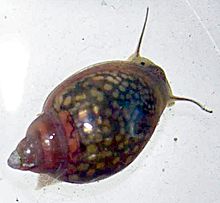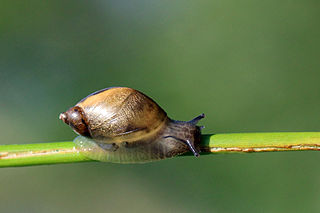
Succinea, common name the amber snails, is a large genus of small, air-breathing land snails, terrestrial pulmonate gastropod molluscs in the family Succineidae.

Planorbidae, common name the ramshorn snails or ram's horn snails, is a family of air-breathing freshwater snails, aquatic pulmonate gastropod molluscs. Unlike most molluscs, the blood of ram's horn snails contains iron-based hemoglobin instead of copper-based hemocyanin. As a result, planorbids are able to breathe oxygen more efficiently than other molluscs. The presence of hemoglobin gives the body a reddish colour. This is especially apparent in albino animals.

Physidae, commonly called the bladder snails, is a family of small air-breathing freshwater snails, aquatic pulmonate gastropod molluscs in the superfamily Lymnaeoidea.

Physella acuta is a species of small, left-handed or sinistral, air-breathing freshwater snail, an aquatic gastropod mollusk in the family Physidae. Common names include European physa, tadpole snail, bladder snail, and acute bladder snail. In addition, Physa acuta, Physa heterostropha and Physa integra are synonyms of Physella acuta.

Physa is a genus of small, left-handed or sinistral, air-breathing freshwater snails, aquatic pulmonate gastropod mollusks in the subfamily Physinae of the family Physidae.
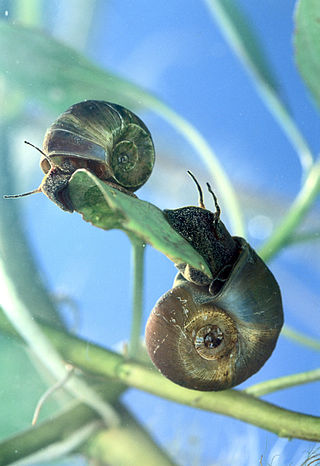
Planorbella is a genus of freshwater air-breathing snails, aquatic pulmonate gastropod mollusks in the family Planorbidae, the ram's horn snails, or planorbids, which all have sinistral, or left-coiling, shells.

Amnicola is a genus of very small freshwater snails which have an operculum. Amnicola species are aquatic prosobranch gastropod mollusks in the family Amnicolidae according to the taxonomy of the Gastropoda.
Glyptophysa is a genus of medium-sized sinistral (left-handed) air-breathing freshwater snails, aquatic pulmonate gastropod mollusks in the family of Planorbidae.

Pleurocera is a genus of freshwater snails with an operculum, aquatic gastropod mollusks in the family Pleuroceridae.
Physella parkeri, the Broadshoulder Physa, is a species of small air-breathing freshwater snail.
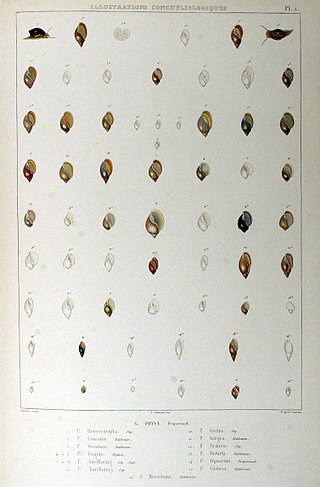
Physella gyrina, common name the "tadpole physa", is a species of small, left-handed or sinistral, air-breathing freshwater snail, an aquatic pulmonate gastropod mollusk in the family Physidae.

Aplexa is a genus of small, left-handed or sinistral, air-breathing freshwater snails, aquatic pulmonate gastropod mollusks in the family Physidae.

Freshwater snails are gastropod mollusks that live in fresh water. There are many different families. They are found throughout the world in various habitats, ranging from ephemeral pools to the largest lakes, and from small seeps and springs to major rivers. The great majority of freshwater gastropods have a shell, with very few exceptions. Some groups of snails that live in freshwater respire using gills, whereas other groups need to reach the surface to breathe air. In addition, some are amphibious and have both gills and a lung. Most feed on algae, but many are detritivores and some are filter feeders.
Physa aridi is a fossil species of air-breathing freshwater snail, an extinct aquatic pulmonate gastropod mollusk in the family Physidae. This species has a small, left-handed shell, as is always the case in this family. Physa aridi dates from the Senonian of the Bauru Group, in São Paulo state, Brazil.
Physa mezzalirai is a fossil species of extinct air-breathing freshwater snail, an aquatic pulmonate gastropod mollusk in the family Physidae. This species has a small and left-handed shell, as is always the case in this family. Physa mezzalirai dates from the Turonian to Santonian-aged Adamantina Formation, in São Paulo state, Brazil.
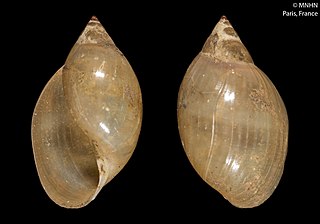
Mexinauta is a genus of small, left-handed or sinistral, air-breathing freshwater snails, aquatic pulmonate gastropod mollusks in the subfamily Aplexinae of the family Physidae.
